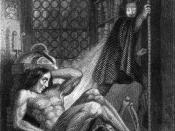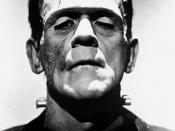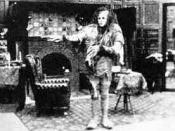In Mary Shelley's Frankenstein, many themes that are present are also present in contemporary society. Many of these themes are universal. The term universal pertains to the "relating to, extending to, or affecting the entire world or all within the world; worldwide; all time periods" (American Heritage Dictionary pg. 1401). These universal themes are seen everyday in life; the theme of playing God, the theme of having control, parenting, and the theme of seeing the perpetrator as the victim or visa versa. These themes reflect the way in which people live today. In Frankenstein, both Victor and the monster are seen as playing God. The monster is a victim, who is seen as a perpetrator, and Victor is seen here as a parent, a neglectful parent.
To start off, the first theme that is present in Frankenstein that is also seen in modern everyday life is the theme of playing God.
Victor here plays the role of God. He has stolen the power to create life from God, just as Prometheus had stolen the power to create fire from the Gods. Although Victor possesses the knowledge to put life into an inanimate creature, he doesn't possess the wisdom to use it wisely. The scene where he creates the monster is a biblical allusion to creation. "It was already one in the morning; the rain pattered dismally against the panes, and my candle was nearly burnt out, when, by the glimmer of the half-extinguished light, I saw the dull yellow eye of the creature open; it breathed hard, and a convulsive motion agitated its limbs" (Pg. 56). At this moment in time the monster is playing Adam, and Victor, his creator, God. Victor creates the monster as an innocent being without sin. The monster is not born evil, nor...



Frankenstein
Very detailed, well-written, and interesting to read. Another great job!
11 out of 11 people found this comment useful.